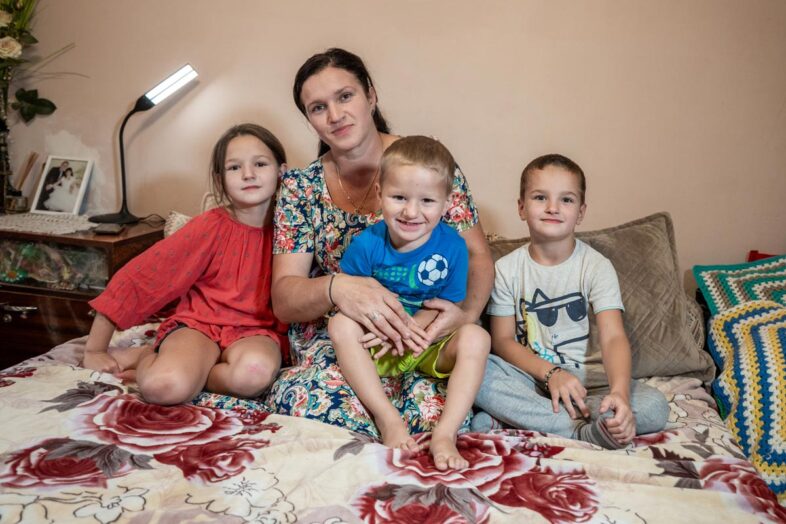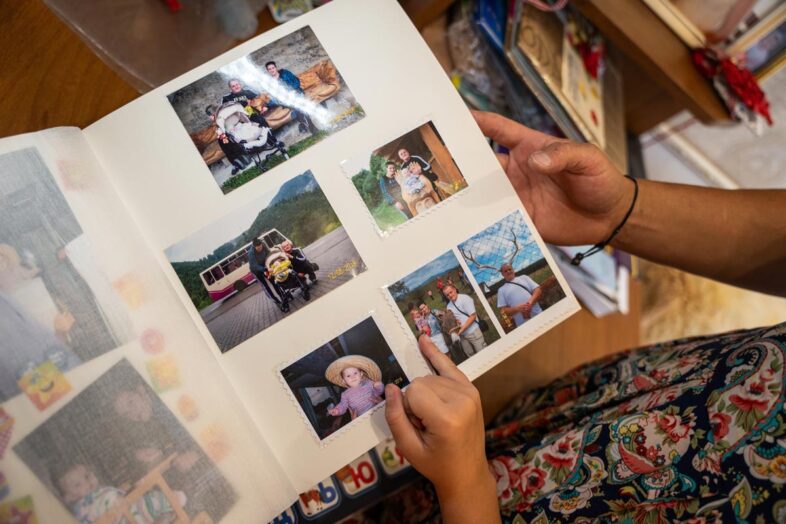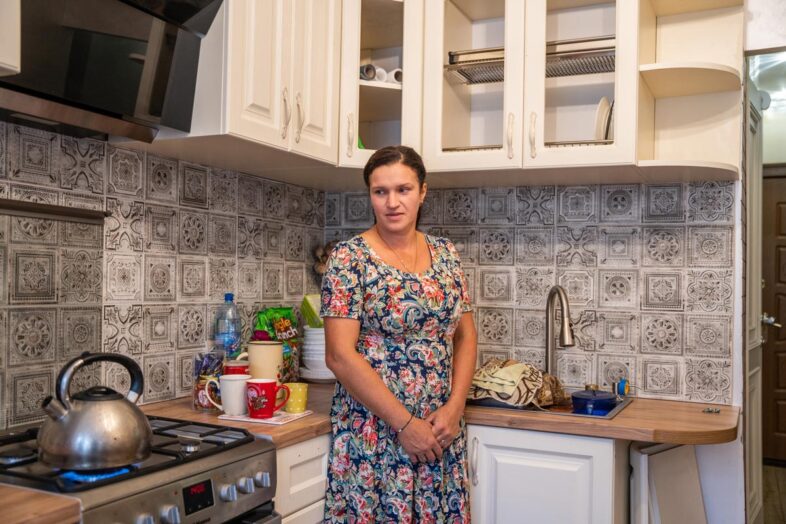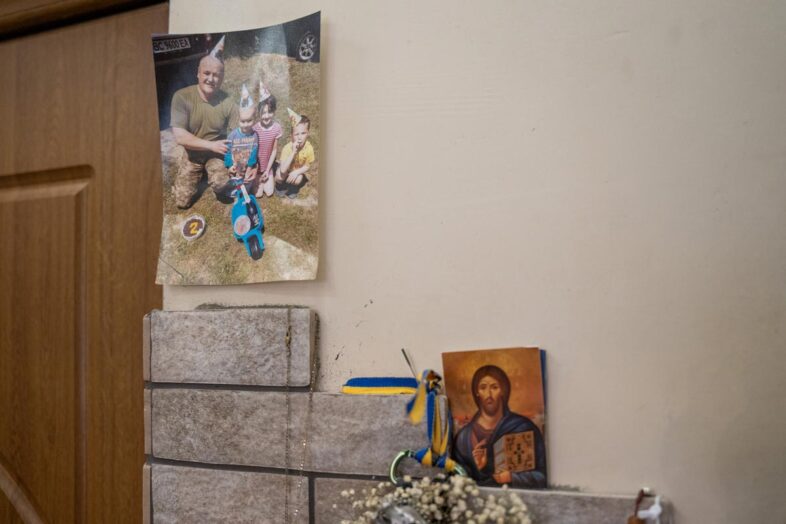In September 2023, during one of the Russian Shahed attacks on Lviv, Petro Burban, a devoted father of three, tragically lost his life when the Russian-launched drones destroyed warehouses filled with humanitarian aid from Caritas-Spes. His wife, Nataliia, finds strength in his memory, cherishing his kindness and leaning on the support of those around her as she strives to carry out her husband’s dreams.
***
“He didn’t go to the front line, yet the Russian war killed him…”
In the early months of the full-scale Russian invasion, Petro volunteered to join the Ukrainian Armed Forces.
“I was very worried and told him, ‘Try to think logically for a minute—you have three children, and you’ve never even been in the army,’” Nataliia recalls. But Petro felt he had no choice. He believed that when an enemy invades one’s homeland with the intent to destroy one’s country and family, one must take up arms to defend everything one holds dear. Although he initially went to Yavoriv, where volunteer units were being assembled for the front, he was assigned to serve in a local military unit instead due to having three small children.
“He was in the territorial defence forces and volunteered at the same time, seeking out gear for our defenders and delivering food, water, and medicine to those on the front lines,” his wife recalls. “When the war began, we read reports of Russian troops advancing on Kyiv and saw photos and videos of tank columns. We couldn’t believe this was happening in the 21st century. Then, the news from Bucha, Borodianka, and Chernihiv started coming in—horrors the world had never seen before. I remember my grandfather, who fought in World War II and was a German prisoner of war. He often recounted his experience as an Ostarbeiter [German for ‘Eastern worker’ – during World War II, Nazi authorities condemned millions of Eastern Europeans to forced labour – ed.], saying, ‘I’ve never met people as cruel as the Russians. Even the Germans treated us prisoners more humanely than the Russians did.’”
Nataliia smiles as she recalls the story of how she met her future husband. One day, while at a car wash and unsure how to manage the various hoses, a young man offered to help wash her car, and that encounter changed her life. From that moment, love blossomed, leading to marriage and a shared desire to build a family. Nataliia reflects, “Petro was a man you could rely on for everything—caring, hardworking, and deeply devoted to our children.” Their daughter, Vasylina, is now 8, while their sons, Mykhailyk and Ivanko, are 6 and 3.

“Petro wanted us to have a fourth child since both of us come from families with four kids. Our children adored their dad; he would play with them, care for them, and engage them in all sorts of conversations. Today, the boys often ask, ‘Mum, what car is this? What make is that one?’ Their dad knew everything about cars and used to tell them all about it. I tell them, ‘Go online and look it up on Google or YouTube because I’m not very knowledgeable about that,’ and off they go to search…”
In September 2023, Petro left the Armed Forces of Ukraine to take a job as a warehouse guard. Tragically, his first day at work turned out to be the most devastating day of his family’s life. It was fatal.
“That night, when the air raid alert sounded, he called me at four in the morning. ‘Nataliia, take cover in the hallway; the Shaheds [Iranian kamikaze drones used by the Russians – ed.] are coming,’ he urged. I was completely wiped out after spending the night canning until midnight. When he called, I said, ‘We’re not hiding anywhere. The war has been going on for so long, and nothing that dangerous has happened.’ I could hear the disappointment in his voice as he replied, ‘What do you mean, you won’t go to a safer place?’”
“Even though he was worried, I lay down, but sleep just wouldn’t come. Suddenly, I heard noises like motorcycles revving through our neighbourhood – a painfully familiar sound of the Shahed drone. I rushed to the window and froze—a triangle-shaped silhouette hovered above the building. It was a Shahed. Panic washed over me, and I called him again, ‘Petro, the Shaheds are coming!’
I could hear anti-aircraft guns firing, but they were missing their targets, and then more gunfire rang out—also a miss. ‘They’re heading into the city,’ I warned him. ‘I can hear it,’ he replied.
The sounds that stopped right outside my window echoed through the phone. I heard the drone, the explosion, and then I heard my husband scream. The call ended, but the connection didn’t—I could still hear everything.”
The Shahed pierced through the thick walls and ceiling of the warehouse, sending a blast wave that caused one of the walls to collapse. Beneath it were three people: a young man, a woman, and my husband. I could hear the other two calling for help, but my husband was silent, having fallen with his head turned the other way. He was just four metres away, yet the rescuers couldn’t hear him. I frantically called the ambulance and the police, screaming into the phone, “There’s a person trapped under the rubble at the warehouse!” I waited for what felt like an eternity for a response. He could have been saved; later, I found out he had no injuries other than suffocation. The other two were freed after 40 minutes, unharmed. But no one found Petro. After five long hours, I discovered him myself. The operator never passed along my calls to the rescue services, and they’re still trying to figure out why. To this day, there’s an open criminal case.
You can see what a journey he had. He didn’t go to the front line, yet the war killed him—on his first day at work. You can’t change a person’s fate; you can’t alter what’s meant to happen to you.
“Even under constant threat, you feel: this is your home”
“Our children are what keep me going,” Nataliia admits. With no grandparents to help, she has to rely solely on herself. Her mother passed away just six months before Petro’s death due to complications from COVID-19, and his entire family is now in Germany. They invited her and the kids to join them, but she turned them down. “You have to envision your life abroad and feel that it’s right for you,” she explains.
“We’re doing well here. Even with the missiles and constant threats, this feels like home. Why should I leave? I read stories about Kharkiv, where people endure strikes every day, yet they still live their lives and clear away the destruction. And here we are in Lviv, which is supposed to be safer. But I still worry every time there’s an alert. We live in the Sykhiv district, and missiles fly over us—if we can’t see them, we can always hear them. When one passes, the whole building vibrates.

I don’t fear death itself; I worry about what would happen to my children if I were gone. I think of that man whose family died on Pryvokzalna. [Yaroslav Bazylevych lost his wife and three daughters in a Russian Kinzhal attack on Lviv on 4 September 2024. — ed.] He’s like an orphan now, all alone. It’s unbearable. My husband is gone, but we have our children. They’re my strength and my reason to keep going.”
“Her life is now filled with faith and ‘airy hopes that all this horror of war will soon end,’ Nataliia says. She holds onto the belief that there will be a sense of security in the future and a chance to raise her children in peace.
“Vasylynka has her mother’s character—she’s stubborn, just like me,” Nataliia laughs. “Sometimes I get annoyed with her defiance, but then I remember how I used to be. The boys are just like their dad, especially Ivasyk—he’s the spitting image of his father. He knows exactly what he wants in life, and all his friends flock to him. He’s very sociable, just like my husband was. Mykhailyk, on the other hand, is responsible. He’s always the first to wake up; he gets everyone else moving on with their day.
The boys go to preschool while Vasylynka is in school. She loves to draw, and the boys are really into Lego and toy cars. My husband and I dreamed of taking the children to the seaside together. I’d still love to take them there, but for now, it’s just not possible. Instead, I bought the kids an inflatable pool with the support we received from local authorities after my husband’s death. So now we have a pool in the village for the summer; a place we often go to escape the constant air raid sirens. We have a house there with a small vegetable garden and an orchard.”
“When Lviv was shelled in early September this year, we were at home in the city. The children were very frightened. We sat in the hallway and prayed, and the explosion was so powerful that it felt like it was right next door. At first, we thought it was nearby, but it turned out to be all the way in the city centre. When the Russian Kinzhals [hypersonic ballistic missiles – ed.] come, there’s only a minute between the alert and impact.”
“Thank you to every family that has opened their hearts to us”
Thanks to support from the Ukrainian-Polish project “Family to Family,” Nataliia has been able to provide everything her children need, including clothes, shoes, and food.
“I’ve stocked up on food supplies to feel at ease. Without their dad, there’s no one to take care of us. I’ve also used some of the funds to renovate our home. My husband and I started this project together; Petro dreamed of refurbishing the place to make it more comfortable. Now, I’m doing my best to make that dream a reality—finishing the renovations. It’s not easy, but I’m even laying the tiles myself, bit by bit, remembering how Petro used to do it.”

Nataliia confesses that the fatigue sometimes becomes so overwhelming that she longs to “die… for a day” just to catch her breath.
“The children are small and very emotional; they need a lot of attention. Now, raising them is entirely my responsibility. Thankfully, the kindergarten has been a tremendous help. I’m really grateful that the Lviv educational authorities assisted us in getting them into a kindergarten close to home. This has lightened my load a bit and allowed me to manage things following my husband’s death. The caregivers are attentive and always willing to help; they understand that everyone has their own challenges.”
She feels supported by many people, especially her husband’s acquaintances. “I had no idea how many friends he had until he died. A sea of people came to offer kind words and support. My husband was just an ordinary guy; he wasn’t a public official or a star. But it was only after the funeral that I realized how much he was valued, not just by me but by so many others as well. It meant a lot to see everyone who came to pay their last respects.”
Nataliia is deeply grateful to the Polish families who responded to the plight of Ukrainians right from the beginning of the war.
“It’s so important for people to open their hearts to one another. Every little bit counts in the eyes of God. He will reward everyone for their deeds,” she says, emphasizing her appreciation for those who have offered support. “To every person, to every family who has opened their hearts to our people, thank you.”
When asked about her greatest dream, Nataliia replies, “A free Ukraine. I never realized how crucial this was until now. Everyday challenges can be managed; if you need clothes, a neighbour will lend you some; if you’re short on food, someone will share their bread. But without freedom, without a state, these little children have no future. You don’t truly understand this until you find yourself in the situation that our people are in today.”
She reflects on the past, saying, “We lived for 30 years in an independent Ukraine without fully grasping how vital it is to be masters of our own home. We are hard-working and can overcome anything. We will plant flowers, bake bread, and sew clothes. I’m a seamstress myself, so I know I’ll find a way to use my skills. We will rebuild everything and create new homes and cities. But if we don’t defeat the enemy on the battlefield, this problem will linger for our children.”
Nataliia visits the Mars Field in Lviv, where Ukrainian defenders are buried. “We used to go often as a family when my husband was alive. Now, I go there alone with the children. They need to understand the value of our freedom. They must know that this price is high and unbearably bitter.”

“Our prayers will be heard”
“Once, I was walking through the city to the store, thinking about the kids, kindergarten, school,” Nataliia recalls. “And for some reason, it hit me: ‘I need to pray for the guys on the front lines, so the enemy doesn’t see them.’ It was a deep, instinctive need, you know? I can’t really explain it. As I walked up the hill, I said ‘Mother of God…’ a few times and then carried on with my day.
Two days later, while scrolling through my Facebook feed, I came across a post from a soldier. He wrote, ‘There was a situation where 15 soldiers found themselves close to the enemy with almost no weapons to defend themselves. The enemy saw us and was shooting left, right, in front of us, behind us… It must have been someone’s prayer—a mother’s, a wife’s, a sister’s, a daughter’s—that saved us.’ That’s exactly what he said, and the timing matched perfectly with when I decided to pray. I asked in my prayer for our defenders to be invisible to the enemy, to stay alive. If the thought of praying crosses your mind, do it. Because God hears each of our prayers.”
Every evening, we pray with the little ones—for the soldiers, the captives, the wronged, the destitute, and the displaced. We also pray for the peace of my father’s soul. When we look up at the sky, I point to a star and say, “See that? That’s your dad. He’s watching over us from up there.”

